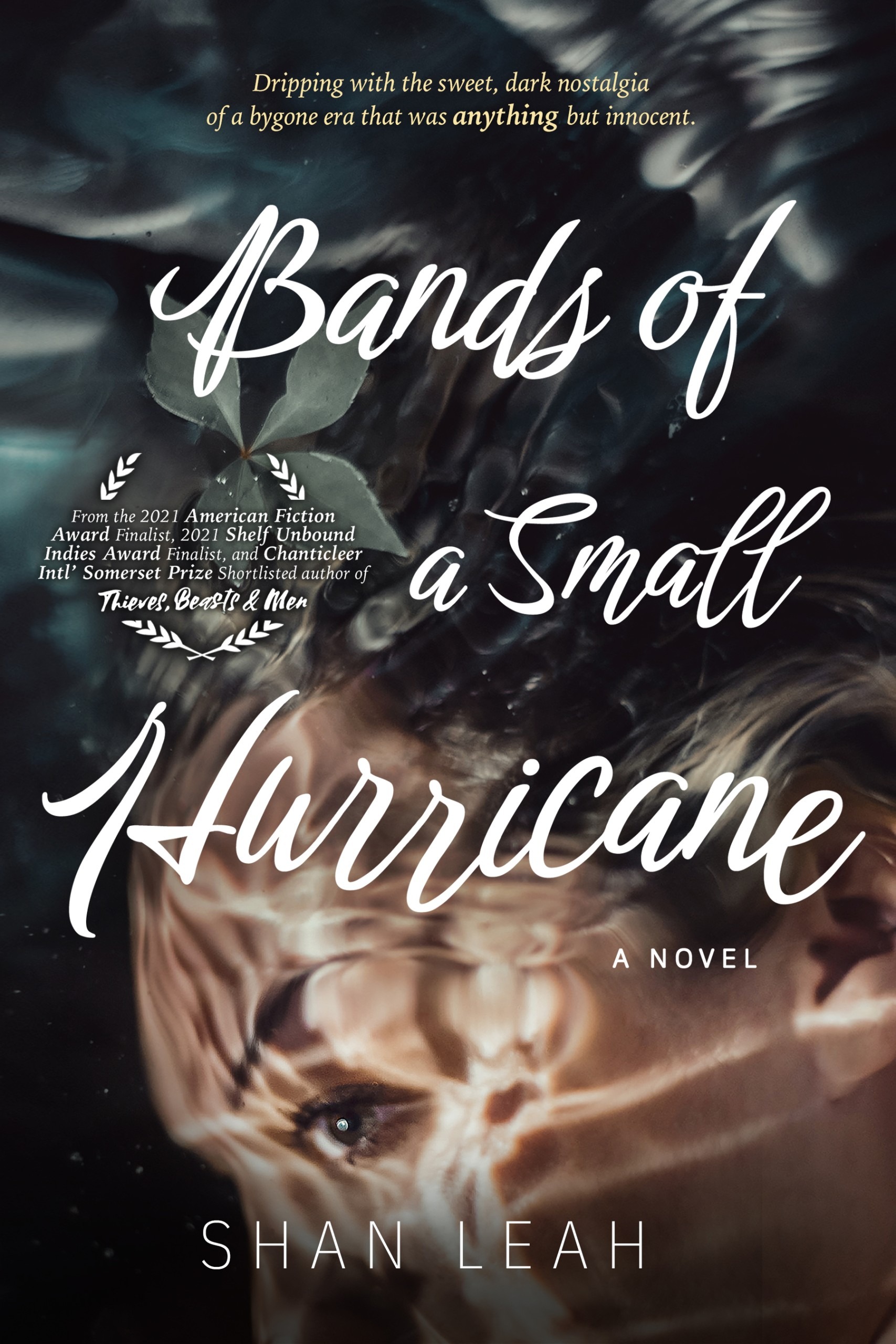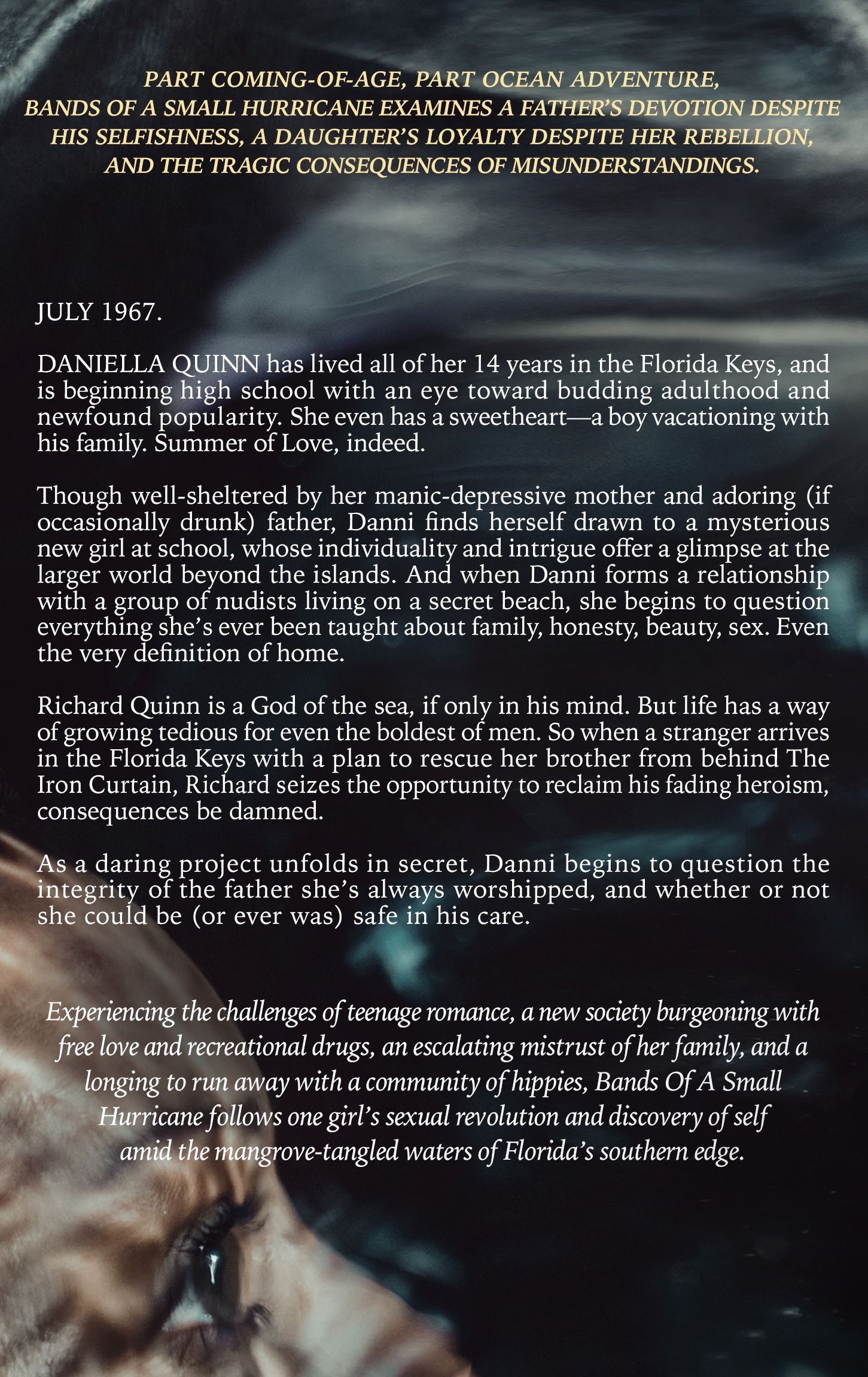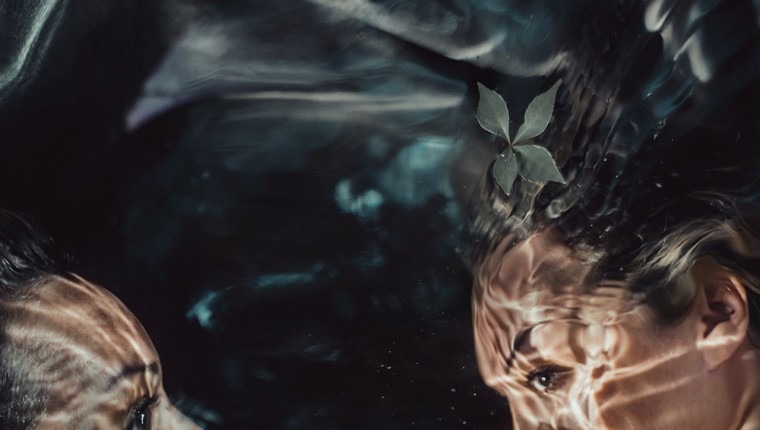It’s frequently said that in order to have a successful career as an author, you must release at least one book a year. I just barely made the deadline! “Thieves, Beasts & Men” was released on Oct 5, 2021. And “Bands of a Small Hurricane” will be released on Oct 4, 2022. I guess October is my lucky month!
Below is the front cover, back cover, and below that: the first scenes of Hurricane.
More information to follow in the coming months, including preorder info, sneak peeks, and a limited edition copy for the first 250 books.


– EXCERPT: FIRST CHAPTER –
PROLOGUE
A father loses his daughter in three distinct phases.
The first is when she begins menstruation. This is no place for a father. A stain in the panties so obscene that it casts dad into a state of intentional blindness. A contract signed long before birth. Because when that time comes, she’s no longer his little girl. Every month, her womanly body now ripens, then opens, then purges. An expectation unfulfilled, a cervix weeping.
The second phase is when she loses her virginity. If she’s lucky, there is love.
I was not so lucky.
When a girl loses her virginity, her entire world is forced open. A boy looming larger, larger, eclipsing all others. There is pain, too. My God, is there pain. And your father, the man who’s protected you, loved you like an extension of his own heart, his own skin, is woefully vacant. Here, there grows a new estrangement.
And then the third phase.
There comes a time in every girl’s life when she begins to see her parents for exactly who they are. Clouds part. Illusions dissipate. Mom is no longer the picture of domesticity. She’s a caged animal, fighting for her own survival. A self-made victim of willful ignorance. And dad is no longer the superhero he once was. He’s a liar, a cheat. And the truth hits you like a stone to the face: your father can’t protect you. He never could. He can’t even protect himself.
My entire life changed the night of the hurricane. It was also the night of the Halloween dance. Dad told mom he’d be chaperoning the dance, but he wasn’t there. He was with that blonde woman from the bar.
I met her once. She had an accent, a slight drawl I couldn’t place.
That was the night I lost my virginity. It happened in the band room, behind the tubas.
Where it smelled of brass oil and spit.
He was a nice boy, but he wasn’t the right boy.
The carpet was sticky and rigid, and my clothes were in a pile by the music stands.
I stared at the ceiling, to the exposed piping with chipped paint next to a small yellow skylight, as a wound exploded from the softest part of my body.
My fingers clawed at a carpet too dense to grasp. My heels sought ground, but they were trapped beneath his body.
It was then that a flash of lightning filled the skylight.
A crack of thunder followed, and as it faded away, a reverberation was left behind. All around us, the instruments began to ring and hum like wine glasses stroked by wet fingers. As though in the sudden absence of sound, they had begun to panic.
CHAPTER 1
A SCORPION OF STARS
(3 months before the hurricane)
Richard Quinn stands at the helm of the Valkyrie, dwarfed by the stars above, and exalted from the waves below. They lift him higher and higher, cresting tall, capped with salty foam that lashes his face. He bares his teeth and screams into the gale whipping in from the Atlantic. He loves every second of it.
The lights of Marathon and her surrounding islands grow smaller behind him. It won’t be long before even the most nocturnal of residents snuff their lamps.
At the bow, Danni bounces on her toes. Like her old man, she craves the sea.
By summer’s end, she’ll be a freshman in high school. But her eyes still hold the wonderment of a child, and for that, he is grateful.
The cool breeze is a welcome reprieve from the Florida heat. In a matter of hours, the sun will rise, the air sagging with moisture. But at this moment, everything is crisp, dark, perfect.
Nearly thirty miles from shore, Richard relies solely on the landmarks of his own memory. No buoys, no maps, no revolving lights. Only the black ocean below, with Saturn and Jupiter beaming down from the night sky. And the watchful gaze of a glittering scorpion, if the atmosphere is clear enough. Tonight, it is.
Danni points ahead and shouts to her father.
She’s spotted it.
Richard cuts the motor, and the Valkyrie coasts across broad swells and closer to the churning waters of the Humps. He descends the ladder to stand beside his daughter.
“The range is right under our feet,” he says.
Danni peers overboard like she’s expecting to see the mountain peak of the Humps beneath the surface.
Richard hands her a flashlight, and Danni balances it on the rail.
The ocean is more smoke than water, dense with swirling clouds of foam and krill. Something darts through the light, a flash of silvery yellow.
Danni jumps. “What’s that?”
“Barracuda.”
“And that?”
“Dolphin. Or tuna. Hard to say. She was fast.”
“We’re on top of the mountain right now?”
“Yep. You see how the water is smooth, and then all of a sudden, it’s choppy, like two completely different oceans?”
She nods.
“That’s where the peak is. The current hits it and wham!” Richard claps his hands. “Instant waves.”
Richard surveys the water. Perhaps this is the night he will finally spot Mister Brownstone navigating the current.
Mister Brownstone is a Florida legend with more sea tales attached to his name than Richard himself. A dinosaur of the sea, somewhere between a thousand years old, or a million, depending on who you ask. Men say the beast is enormous, upwards of twenty feet long.
Many times, Richard has insisted, “Longer. Thirty feet. Wide as a sailboat. I’ve seen ‘im myself.”
But Richard has never seen Mister Brownstone. He’s only heard the stories of other men. Of tarpon pilfered from fishing lines, the mammoth hammerhead shark springing from the depths to snatch fish from the air, startling the fishermen as much as the tarpon.
Richard throws a glance toward the islands, but as always, the giant shark remains concealed beneath the infinite black.
“Be careful, pumpkin,” he says, grasping his daughter’s shoulder. “If you fall in, I might not get to you before the sharks do.”
I lean over the railing as though in flight, illuminating underwater galaxies.
The ocean churns like water on a stovetop as the waves crest above the submerged mountain range, arcing into a circle before melting into the calmer swells beyond. I imagine a sea monster sleeping far below, his snores creating sound waves that travel up, up, up, rippling the surface.
A school of small white fish funnel into the flashlight beam, circling and darting as though unable to escape the boundary.
Only one brave soul breaks free, leaving the rest imprisoned.
Dad takes the flashlight and turns it off, placing it on the deck. He clicks on a small lantern and whispers, “Come with me.”
I follow him to the stern where the lantern exposes a mere crescent of his face, like a crime noir comic. He stands there for a long moment, chiseled by moonlight and smelling of salt and leather, and I beam with pride.
Richard Quinn. My dad.
He spreads his arms and winks at me. And then, like an anchor he falls backward, crashing into the water below.
“Dad!” I yell, running to the edge, peering into the depths. “Daddy!”
I search for his shirt, his hair, anything. We’re miles from shore. No neighbors to call for help. Not even a full moon to light the way home.
My mother’s voice floods my head: One day your father is going to get on his boat and never come back. Poof. Just disappear.
Mom always says this. A self deception she can’t escape from. And every time she speaks these words, I want to slap my hand over her mouth and pinch her lips shut before she wills her own worst fear into existence. My worst fear, too.
But dad would never do that, and I wish she would stop saying it.
I hear something splash in the distance, and rush to retrieve the flashlight, begging the stars above to let it be my father and not Mister Brownstone.
By the time I return, dad’s hands are grasping the stern, his body bobbing up and down like a buoy. He flings his head backward to the rid water from his face.
“Get in,” he urges.
“No way! There’s sharks!”
He scoffs. “Sea puppies.”
“Sea puppies with teeth!”
He grins up at me, a gaping, lopsided smile that looks absurd on his face. “Mine are bigger.”
And then dad kicks away from the boat, floating high and low atop the ocean.
“Get in, pumpkin. It’s the only way to see the stars.”
I think of all the things that could be below us right now. Not real sea monsters, of course, but tuna and swordfish, giant groupers and barracudas, stingrays and sea turtles, mountain ranges and an endless abyss. And yes, sharks.
“I’m scared,” I confess.
“I won’t let anything happen to you.”
And I know he’s telling the truth.
I step closer to the edge.
Hold my nose.
Count to five.
And jump.
The ocean is warmer than I expect, and I float on my back, casting a celebratory, “Woohoo!” into the night before paddling closer to dad.
I think once more of all the scary and dangerous things that are surely waiting in the darkness. But the swells quickly soothe my fears.
Because dad was right—this is the only way to see the stars.
Richard Quinn collapses onto the couch in his study, depleted, yet still greedy. Already, he misses the sea.
The pillow has long ago gone limp, so he folds it in half before wedging it into his neck.
On his desk is a small bronze statue of a whale. It’s heavy, practically a paperweight, and stacked beneath it are lesson plans for his upcoming American Lit class.
Danni isn’t the only one anticipating the commencement of a new school year.
Richard adjusts his assignments periodically to alleviate his growing boredom. This year, he’s decided to assign To Kill a Mockingbird as their reading requirement, since Catcher in the Rye was removed from the library for profanity and sexual situations. If he is ever to assign To Kill a Mockingbird, it has to be now. Already, parents across the nation are beginning to speak out against it. A recent protest described the book as “damaging to integration,” and accused schools of “institutionalized racism.”
Richard listens to Miriam toss about in the next room. She won’t be pleased with his late-night arrival home. He should buy her something pretty. Maybe that electric skillet she’s been wanting—in pink, to match her hand mixer.
Richard mashes his face into the pillow, and the fabric snags his whiskers. He closes his eyes.
When he can’t sleep, Richard imagines he is fishing, the pole rigid in his hands, the line swaying from side to side.
Winding.
Pulling.
The clacking of the reel.
But tonight, sleep eludes him, and his thoughts return to the upcoming school year.
Though his lesson plans vary from year to year, one thing remains unchanged: on the final day of school, Richard Quinn enters his classroom without a word and drops a heavy book onto his desk to get their attention. He waits for silence, reverence.
He waits until the hum of anxiety fills the room.
It used to be easy, but word has been passed down. Last year, students eagerly awaited him on that final morning—and other students cut their classes to sneak into his room—just to hear his book slam against the wood. To hear Mr. Quinn recite, entirely from memory, the first chapter of Moby Dick, his voice roaring so loudly that neighboring teachers pounded on the walls.
Tucked into the couch in his study, Richard recalls his favorite lines, one by one, drawn out and deliberate.
Call me Ishmael. Some years ago—never mind how long precisely—having little to no money in my purse…
Miriam continues to slumber in the bedroom, and as she shifts beneath the sheets, Richard pictures her body shifting as well, thin and tan, and he is suddenly erect.
Deep into distant woodlands winds a mazy way, reaching to overlapping spurs of mountains bathed in their hill-side blue.
Richard adjusts his erection against his leg and hopes it goes away; he’s almost to his favorite line.
…two and three there floated into my inmost soul, endless processions of the whale, and, mid most of them all, one grand hooded phantom, like a snow hill in the air.
Miriam coughs in her sleep, a gentle and feminine sound. Richard strokes himself through pants still damp with seawater, and licks the salt from his arm, just to taste the ocean.
And when he can take no more—when his body is ready to burst like a wave over the reef—he leaves his study and takes his wife.
– END OF FIRST CHAPTER –



